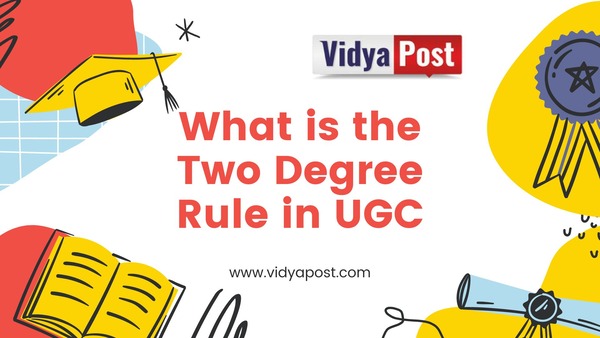What is the Two Degree Rule in UGC

The University Grants Commission's (UGC) decision to allow students to pursue two full-time academic programs simultaneously has been making waves in the education sector. In April 2022, the UGC proposed a plan that allowed students to simultaneously pursue two full-time degree courses. Under the new guidelines, students could enroll in physical + physical, physical + online mode, or online + online mode to complete the courses without losing any academic years. The new scheme applied to undergraduate, postgraduate, diploma, and certificate courses, and students could enroll in the same or different universities. IGNOU has also issued guidelines for the implementation of this new scheme.
Previously, students were not allowed to enroll in two courses simultaneously, and they had to complete the first degree before enrolling in the second one. The initiative is in line with the New Education Policy (NEP) of 2020, which advocates the creation of a flexible and multidisciplinary education system that promotes interdisciplinary education. The move is expected to revolutionize higher education in India by providing students with greater flexibility and choice.
Also, Read Best course you can pursue after 12th
MODE OF LEARNING
Under the UGC's 2-degree rule, students will have the option to choose a face-to-face, online, or hybrid mode of learning for their two different degree programs. However, if a student intends to pursue two different programs in physical mode, the universities offering these courses must be situated close to each other. For instance, a student studying BTech at IIT Delhi can opt to study BA in German or French at JNU. To avoid clashes, one of these programs must be in the evening. Since it is rare for two top universities to be situated close to each other, the UGC allows students to take up online degrees or distance learning programs, thus offering flexibility in terms of mode of learning.
ADMISSION POLICY FOR PURSUING TWO DEGREES SIMULTANEOUSLY
To pursue two different courses under the UGC two-degree rule, the admission policies for each course will be finalized by the respective university. For undergraduate courses in central universities, students will have to appear for the Central University Entrance Test (CUET), while online programs are open to anyone who has cleared Class 12. The university will have to frame its own academic ordinances based on the UGC guidelines on two degrees, which will govern this arrangement. For courses that are offered by different institutions, their respective statutory bodies will have to decide on the eligibility criteria. If a student meets the requirements, they will be eligible for admission to the program.
CHANGING ACADEMIC PROGRAMMES
Under the UGC's two-degree rule, students will have the option to change their academic programs as per their choice, aligning with the multiple-entry-multiple-exit mandate introduced by the National Education Policy (NEP 2020). As long as students fulfill the credit requirements, they can drop one course and join another. Additionally, students can opt for an additional program anytime during the course of their first degree or diploma program.
CREDIT REQUIREMENT FOR PURSUING TWO DEGREES SIMULTANEOUSLY UNDER THE UGC GUIDELINES
According to the UGC guidelines, students pursuing two different degrees simultaneously must earn all the necessary credits to earn a degree, diploma, or certificate. This applies to courses with overlapping subjects as well. Even if some courses in two academic programs are the same, students must earn credits for all courses in both programs, without any concession on credit requirements.
CAN STUDENTS PURSUE TWO DIFFERENT LEVEL DEGREE PROGRAMS SIMULTANEOUSLY UNDER UGC'S NEW GUIDELINES?
The UGC's new guidelines allow students to pursue any combination of degree programs at the same level. However, students enrolled in a bachelor's program cannot directly join a postgraduate course. Under the new guidelines, students can opt for two undergraduate programs or two postgraduate programs, but not a postgraduate course along with a bachelor's program. The guidelines apply only to lecture-based courses, such as undergraduate, postgraduate, diploma, and certificate programs, and not to MPhil and PhD programs.
EXAMINATION SCHEDULE FOR TWO DEGREE RULE BY UGC
The universities and educational institutions will be required to design the examination schedule based on the enrollment of students in different programs. Universities that have agreed to offer courses simultaneously can collaborate to create a suitable exam schedule for the students.
Several subject experts and scholars have expressed concerns about the University Grants Commission's (UGC) decision to allow students to pursue two full-time academic programs simultaneously in physical mode. Critics argue that this policy may negatively affect the quality of honors courses at the undergraduate level.
They believe that pursuing two degrees simultaneously could lead to chaos and disturb schedules, particularly in courses like horticulture, where practicals are essential. It could also lead to a dilution of the quality of degree programs. Moreover, academicians believe that the option to study two subjects simultaneously was already available and that this new provision was unnecessary. Pursuing two degrees could leave little time for other interests, impact mental health and, in turn, affect academic scores negatively.
In response to these criticisms, UGC Chairman M Jagadesh Kumar defended the policy, stating that it is an additional option provided to students who want to pursue two subjects. He clarified that the provision is not intended to discredit existing programs but to offer students additional opportunities to pursue more than one degree.
He emphasized that this policy should be seen as an option to help students learn an extra skill and gain expertise to be future-ready and improve their employability chances.
In conclusion, the UGC's new guidelines offer students greater flexibility and choice in their academic pursuits, and the initiative is expected to revolutionize higher education in India.
Also, Read 7 Benefits of studying a distance learning degree in 2023
Share:

2 Comments
Jordan Singer
2d2 replies
Santiago Roberts
4d